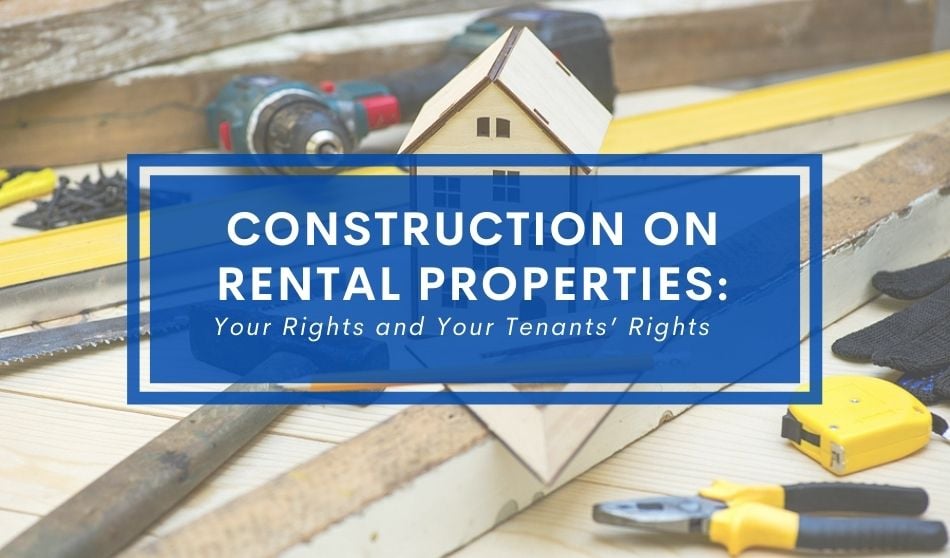
Making money off an investment property is one of the biggest advantages of owning one. Sometimes, though, that can mean navigating some tricky situations with rental units. Renting out your space may be a great source of income, but the time will come when upgrades are needed. Whether you want to make your update your rental in preparation for tenant turnover, or you simply need to perform routine property maintenance, things can get complicated when people live there.
If you’re planning to renovate your property, it’s important to know your and your tenants’ rights. There are plenty of reasons to make improvements while you have renters, and they may even benefit from these upgrades. However, there is a right and wrong way to do things, and it’s vital to respect residents’ rights. If you’re thinking about making some changes, here are a few things to keep in mind.
Look at Your Lease First
Each lease agreement is different, so the first step is a thorough examination of your respective tenants’ lease. Most leases have a standard agreement about making necessary repairs. However, if your lease happens to state anything different from the usual fare, you must follow the outlined regulations. Leases are legal contracts, so following the agreement you made when you signed with your tenants is your first priority.
Understand Your Right to Improve the Property
As the property owner, you do have the right to perform necessary repairs maintenance. In fact, you can be legally required to make some improvements and repairs to ensure that the property is habitable. Depending on your local state and municipality’s laws, you may also have the right to renovate your building — within reason. Most state laws state that the landlord cannot enter a tenant’s dwelling whenever they want without permission or forewarning. Therefore, if the renovations in question involve entering or altering the unit where your tenants live, you will still need to notify them of your plans.
However, if your renovations don’t impact the tenants’ space, you may be able to move forward with your improvement plans. Just ensure that you are not infringing upon your tenants’ space.
Have Proper Communication
If you plan to renovate your property, communicating with your tenants is vital in making sure things go smoothly. Even if you aren’t contractually or legally obligated to notify them of changes going on in a timely manner, most people don’t take too kindly to construction workers and loud noises appearing out of the blue. If your planned renovations won’t directly impact your tenants’ space but may still be noticeable to them, it’s best to inform them ahead of time.
If your construction on your rental property will reasonably impact your tenants’ quality of life or use of space, communication is even more imperative. Renters have what is often referred to as the “right to quiet enjoyment of their space,” which essentially means that obstruction or alterations to what you agreed to in the lease are not allowed.
However, there are ways to work out arrangements that satisfy everyone. Additionally, regardless of whether your renovations will directly affect your tenants’ dwelling, working with contractors who respect your tenants’ rights, communicating with them about privacy regulations, and only working during certain hours can make things much smoother.
Determine if Construction Impairs Use of Space
There are many details up for debate when it comes to determining what infringes upon a tenant’s right to their space, but there’s also a lot you can do to work out solutions. Most people talk about the right to quiet enjoyment, but examples of infringements can vary widely. Anything from a barking dog to a blocked entrance can constitute an impairment of those rights.
Have an open and honest conversation with your tenants, they may be willing to endure a small amount of inconvenience for an enhanced property. For specific questions about whether your renovation will violate your renters’ right to quiet enjoyment, consider checking with a legal expert in your area.
While small renovations can often be handled easily, larger issues might need a bit more work, and cause more inconvenience to your tenant. This includes cutting off access to a bedroom or bathroom, turning off vital resources like power and water, restricting outdoor space, or embarking on a long, drawn-out process. Unless there is an immediate need to address these issues during tenancy, larger projects are best saved for tenant turnover.
You do have the right to renovate your property, but if you plan to infringe upon the agreement you promised your tenants in the lease, communication, a written agreement, and compensation will likely be in order. If you can work together to find something that makes sense for everyone involved while your tenant still occupies the rental, that’s even better.
Offer Rent Reduction
If your plan to renovate during your tenant’s lease term will realistically infringe upon their right to enjoy and use their living space as intended, one of the things you can do is reduce their rent during the project. While this might not be ideal for you, it makes sense that the tenants want what they pay for in terms of space. Plus, being upfront about the situation and offering your tenants something in return for the inconvenience makes them feel seen and respected and puts conflicts to rest before they even surface.
Know Your Rights
The upkeep of your property is likely a priority, and having tenants living there doesn’t change that. While you have the right to renovate, your tenants also have the right to the space they agreed to in their lease. There are many ways to navigate this balance, and it all depends on your project, residents, and specific situation.
There are ways to improve your unit without inconveniencing the people living in it. With proper communication, attention to your lease, and perhaps a bit of negotiation, you’ll be starting construction on your rental property in no time at all.






you find a location for a business, the place is need of major repair, as a lessee you ask can you renovate, landlord agrees, but worries about increase in property taxes, lessee offers to pay half on the increase, landlord declines the offer, 1 year lease is signed, COVID hits, renovation continues to the tune of 20+ thousand, business put on hold for the 2 yrs of COVID, lease expires, landlord states will renew lease, no lease is produced, lessee loses business partner, personal life issue hinders the future of the intended business, lessee still continues to pay landlord, now 4 & 1/2 yrs go by, lessee gets no formal notification on eviction, although in constant communication with landlord. left with a loss of 20+ thou. on renovation and 4+ yrs of paying rent and no formal eviction warning, other than “I no longer want to rent to you” . Is there no recourse for at least recouping some or all of the monies invested in the upgrading of the property?
I. Wheeler on January 21, 2023 at 7:57 am
you find a location for a business, the place is need of major repair, as a lessee you ask can you renovate, landlord agrees, but worries about increase in property taxes, lessee offers to pay half on the increase, landlord declines the offer, 1 year lease is signed, COVID hits, renovation continues to the tune of 20+ thousand, business put on hold for the 2 yrs of COVID, lease expires, landlord states will renew lease, no lease is produced, lessee loses business partner, personal life issue hinders the future of the intended business, lessee still continues to pay landlord, now 4 & 1/2 yrs go by, lessee gets no formal notification on eviction, although in constant communication with landlord. left with a loss of 20+ thou. on renovation and 4+ yrs of paying rent and no formal eviction warning, other than “I no longer want to rent to you” . Is there no recourse for at least recouping some or all of the monies invested in the upgrading of the property?
Hello, I am a Renter and my family and I have lived in this unit on and off since 1994. I live in Honolulu Hawaii. All the owners and Renters were just informed from the Mgmt Company that They will be Replacing ALL the Drain Piping in Every Unit and Everyone who lives here, Myself and my Dog included will have to Be gone from 8am-4pm. I was givin a Diagram of where they need access to work and that I have to Move Anything like Furniture out of the way. Remove everything from the Bathrooms. Openning walls to replace piping and it is scheduled for 18 days from Dec.18-Jan 4th. I am a Disabled Veteran with Stage 4 COPD. All my Oxygen Equipment is here.They say only a little dust. A little Drywall dust is Harmfull for me. I can’t find anything for Hawaii regarding the right to stay put, As other States have. And don’t I have the right to be able to Quiet Enjoyment.They say they can’t afford to pay for alternative places to stay. Can’t cook while they are in the Kitchen, They say we will not be able to use the Facilities if they are working in the bathroom. Just Curious… Jeff
Landlord leased his property without getting permits for the renovation of the apartmemt. What are my rights to move out.
My tenant decided to move out even though he has broken the lease but agrees to pay the rent until I find a new tenant. As the landlord can I legally make improvements while waiting to rent the house again.